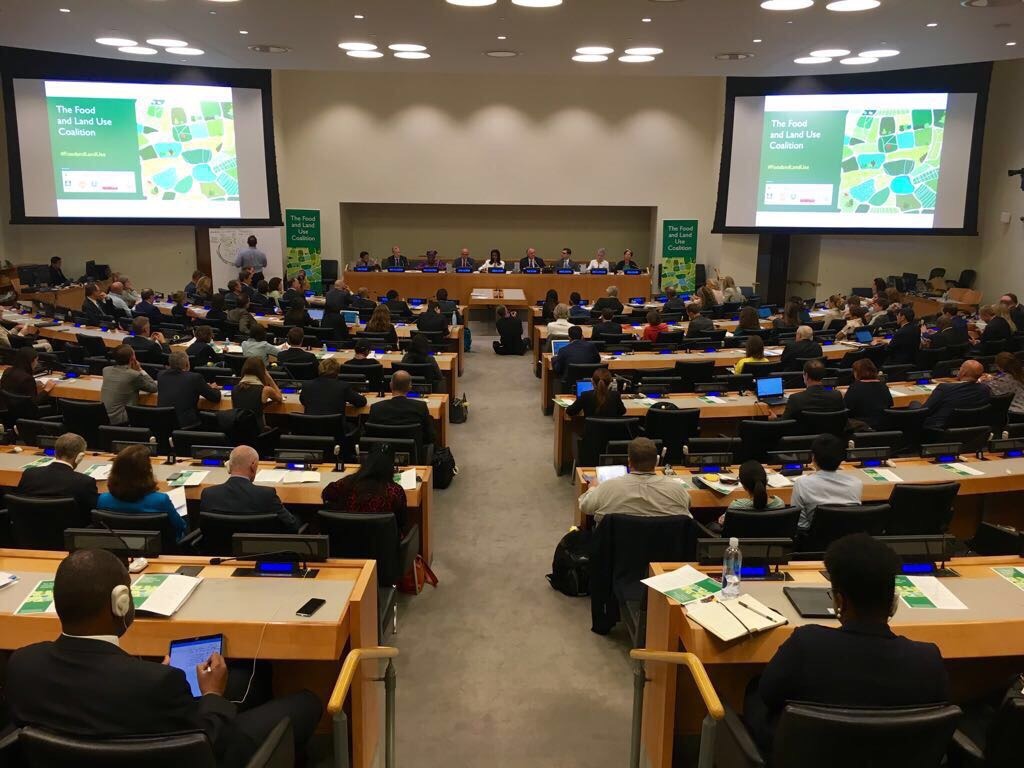NYC, USA As part of the United Nations General Assembly in New York, experts representing business, government and civil society came together to discuss the challenges facing today’s food and land use system, and the opportunities for solving them. The purpose of the discussion was to present the case for a sustainable transformation of global systems to meet social, economic and environmental needs, and the Food and Land Use Coalition (FOLU) as part of the solution. The Coalition brings together organisations representing key actors needed to transform the global food and land use system, including scientists, policy makers, as well as leaders from business and civil society.
Moderated by journalist Zeinab Badawi, the panelists discussed the moral imperative for change, the business case for accelerating change, and the national and local solutions required to create an enabling environment for system transformation. Each of these discussion points are based on compelling cases. The moral imperative rests in not only the need to improve smallholder farmer incomes, but also to mitigate climate change and address vast global nutritional inequalities. The business case rests in the $2.3 trillion annual opportunity in sustainably transforming food and land-use systems by 2030. Alongside this global context, there is a need to consider local and regional conditions that can support or impede progress, such as national policy, investment conditions and monitoring systems.
Norway’s Minister of Climate and Environment, Vidar Helgesen kicked off the event by discussing the ‘false trade-off’ between feeding a growing global population and protecting the natural capital on which we depend. The result, he said, is a system characterised by poverty, ill-health, profound inequality, damaging impacts on climate and land degradation. Hegelsen recognised the role of the Coalition in breaking down siloes and bringing cross-sectoral expertise together to “better understand the interconnected challenges that we are trying to solve and find the solutions that work in a complex reality.”
Highlighting the enormous business opportunity in transforming food and land use systems, Paul Polman, CEO of Unilever, stated that, while the current system is not fit for purpose, business cannot go it alone. The Food and Land-Use Coalition brings together diverse stakeholders united by a “common passion to [create] an uncommon collaboration,” to provide technical solutions and helps to drive the courage and political will for sustainable change.
A Coalition leader, Gunhild Stordalen, Founder & President of the EAT Foundation, set out a fundamental aim of the coalition as that of establishing the science-based definition of sustainable diets globally. Transformed systems must shift from being a main driver of global challenges to a key tool in tackling them.
The other panellists included Sara Menker (CEO of Gro Intelligence), Ngozi Okonjo-Iweala (Former Finance Minister, Nigeria & Former Managing Director, World Bank), Sergio Londoño Zurek (Director of the Presidential Agency of Cooperation, Colombia), Gerda Verburg (Coordinator, Scaling Up Nutrition) and Svein Tore Holsether (CEO, Yara International).
The group went on to discuss the huge and untapped potential for data in agriculture, the need to bring tribes together to deliver solutions at scale, and the importance of empowering rural communities through finance and information. Collaboration ran as a thread through the discussions, including public-private partnerships and the need to involve civil society and the farmers themselves from the outset of the initiative.
Svein Tore Holsether (CEO, Yara International) agreed that such transformation demands collective action, and underlined the economic and moral imperative for action: “we know that inclusive and sustainable business models are possible, and what’s more it’s the only way forward for the smallholders, for the food industry, for consumers and for the world.”
Learn more about FOLU:


